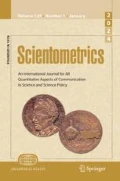Abstract
This paper gives an overview of the potentials and limitations of bibliometric methods for the assessment of strengths and weaknesses in research performance, and for monitoring scientific developments. We distinguish two different methods. In the first application, research performance assessment, the bibliometric method is based on advanced analysis of publication and citation data. We show that the resulting indicators are very useful, and in fact an indispensable element next to peer review in research evaluation procedures. Indicators based on advanced bibliometric methods offer much more than ‘only numbers’. They provide insight into the position of actors at the research front in terms of influence and specializations, as well as into patterns of scientific communication and processes of knowledge dissemination. After a discussion of technical and methodological problems, we present practical examples of the use of research performance indicators. In the second application, monitoring scientific developments, bibliometric methods based on advanced mapping techniques are essential. We discuss these techniques briefly and indicate their most important potentials, particularly their role in foresight exercises. Finally, we give a first outline of how both bibliometric approaches can be combined to a broader and powerful methodology to observe scientific advancement and the role of actors.
Similar content being viewed by others
References
S. Cole, L. Rubin, J. R. Cole,Peer Review in the National Science Foundation. Washington DC: National Academy of Sciences, 1978 (ISBN: 0-309-02788-8).
ABRC.Peer Review: A Report to the Advisory Board for the Research Councils from the Working Group on Peer Review (‘Boden Report’). London: Advisory Board for the Research Councils (ABRC), 1990.
H.-D. Daniel, An evaluation of the peer review process at Angewandte Chemie,Angew. Chem. Int. (Ed. Engl.) 32 (1993) 234–238.
A. J. Nederhof, The validity and reliability of evaluation of scholarly performance. In:A. F. J. Van Raan (Ed.),Handbook of Quantitative Studies of Science and Technology, Amsterdam: Elsevier Science/North-Holland, 1988, p. 193–228 (ISBN: 0-444-70537-6).
H. F. Moed, R. E. De Bruin, Th. N. Van Leeuwen, New bibliometric tools for the assessment of national research performance: Database description, overview of indicators and first applications,Scientometrics, 33 (1995) 381–422.
H. Moxham, J. Anderson, Peer review: a view from the inside,Science and Technology Policy, (1992) 7–15.
M. Polanyi, The republic of Science, its political and economic theory,Minerva, 1 (1962) 54–73.
D. J. van de Kaa, Picking the winners by consensus: grant-giving practice in the Netherlands,Higher Education, 28 (1994) 59–83.
D. Müller-Böling (Ed.),Qualitätssicherung in Hochschulen: Forschung, Lehre, Management (Quality Care in Universities: Research, Teaching, Management). Gütersloh: Verlag Bertelsmann Stiftung, 1955 (ISBN: 3-89204-184-9).
VSNU,Quality Assessment of Research. Netherlands Biology in the Nineties. Utrecht: VSNU, 1994 (ISBN: 90-801015-7-5).
D. F. Horrobin, The philosophical basis of peer review and the suppression of innovation,Journal of the American Medical Association (JAMA), 263 (1990) 1438–1441.
A. F. J. Van Raan, Th. N. Van Leeuwen, Evaluation of the performance of three European environmental research institutes. Policy and management relevance of advanced bibliometric methods, To be published, 1996.
A. F. J. van Raan, Advanced bibliometric methods to assess research performance and scientific development. Basic principles and recent practical applications,Research Evaluation, 3 (1993) 151–166.
A. F. J. van Raan, Th. N. van Leeuwen,A Decade of Astronomy Research in the Netherlands. Research Report to the Netherlands Organisation for Scientific Research (Astronomy Division, NWO/ASTRON). Leiden: Centre for Science and Technology Studies, report CWTS-95-01, 1995. A shorter version of this report will be published as a journal paper.
A. J. Nederhof, E. C. M. Noyons, International comparison of departments' research performance in the humanities,Journal of the American Society for Information Science (JASIS), 43 (1992) 249–256.
H. E. Roosendaal, Roles of bibliometrics in scientific communication,Research Evaluation, to be published, 1996.
T. Braun, W. Glänzel, A. Schubert, Scientometric indicator datafiles. A multidimensional machine readable database for evaluative purposes,Scientometrics, 28 (1993) 137–150.
H. F. Moed, J. G. M. van der Velde (1993),Bibliometric profiles of academic chemistry research in the Netherlands. Research report to the Netherlands Organisation for Scientific Research (Chemistry Division, NWO/SON). Leiden: Centre for Science and Technology Studies, report CWTS-93-08, 1993.
H. F. Moed, F. Th. Hesselink. The publication output and impact of academic chemistry research in the Netherlands during the 1980's. Bibliometric analysis and policy implications,Research Policy, to be published, 1996
VSNU.Quality Assessment of Research. Pedagogical and Educational Sciences. Past Performance and Future Aspects. Utrecht: VSNU, 1995 (ISBN: 90-5588-020-5).
P. M. Kroonenberg, R. Van der Veer, Internationale publikaties en kwaliteit. Een onderzoek naar het publikatiegedrag van Nederlandse pedagogen en onderwijskundigen (International publications and quality. A study of publication patterns of educational psychologists in the Netherlands),Pedagogische Studiën, to be published, 1996.
R. J. W. Tijssen, A. F. J. van Raan, Mapping changes in science and technology: bibliometric co-occurrence analysis of the R&D literature,Evaluation Review, 18 (1994) 98–115.
E. C. M. Noyons, A. F. J. van Raan,Mapping the development of neural network research. Structuring the dynamics of neural network research and an estimation of German activity. Research report to the German Federal Ministry of Education, Science and Technology (BMBF). Leiden: Centre for Science and Technology Studies, report CWTS-95-06, 1995. A shorter version of this report will be published as a journal paper.
E. C. M. Noyons, M. Luwel, H. F. Moed,The Position of IMEC in the Field of Micro-Electronics. Research report to the Ministry of the Flemish Community, Brussels. Leiden/Brussels: Centre for Science and Technology Studies/Ministry of the Flemish Community, Report D/1996/3241/002, 1995 (ISBN: 90-403-0052-6).
BMFT.Deutscher Delphi-Bericht zur Entwicklung von Wissenschaft und Technik. Bonn: Bundesministerium für Forschung und Technologie (BMFT, now BMBF), 1993 (ISBN: 3-88135-267-8).
Author information
Authors and Affiliations
Rights and permissions
About this article
Cite this article
van Raan, A.F.J. Advanced bibliometric methods as quantitative core of peer review based evaluation and foresight exercises. Scientometrics 36, 397–420 (1996). https://doi.org/10.1007/BF02129602
Received:
Issue Date:
DOI: https://doi.org/10.1007/BF02129602




